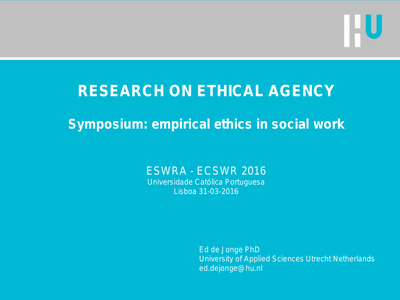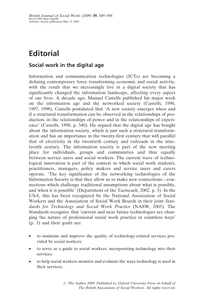Symposium ESWRA - ECSWR 2016: empirical ethics in social work. Objective: ethical aspects of social work (esp. at home) Structure: cooperation of the research group of UAS Utrecht Netherlands with six regional welfare organizations Method: practice based ethics research Focus on professional practice: learning from moral experiences in frontline practice (cf. Van Doorn, 2008) Hybrid approach: combining theoretical resources and professional practice (cf. Banks & Gallagher, 2009) Mixed methods: desk research, interviews, best practice units (BPU), development of ethical tools
DOCUMENT

Thesis: Ethics work (Banks 2012, 2016) is a stimulating concept for the ethical improvement of inter-professional cooperation. Outline: Starting point: ideal-typical professionalism Introduction to ethics work Professionalism requires inter-professional cooperation Inter-professional expansion of ethics work Final remarks and further challenges
DOCUMENT

Sarah Banks (2012) describes ethics work mainly as the effort people put into developing themselves as good practitioners. She discerns six aspects of ethics work: identity work, framing work, reason work, emotion work, role work and performance work. Although ethics work focuses on the ethical development of individual practitioners within their profession, the concept and all its aspects can be transferred into an ethical guideline for the collective development of practitioners in interprofessional cooperation. As such the concept of collective interprofessional ethics work can also be used as a set of criteria for the ethical evaluation of interprofessional cooperation, as is shown on the basis of an experiment in Belgium
DOCUMENT

In this co-authored article, one contributor presents a case story from an interview with a social worker in Slovenia, while five others offer commentaries on ethical aspects of the case. The story comes from a practitioner working with a pregnant young woman, arranging for adoption following birth. The article ends with reflections on the value of exploring multiple perspectives and engaging in dialogue in developing ethical understandings and actions.
DOCUMENT
In this article, we describe a study on the impact of an ethics program aimed at strengthening the ethical agency of 15 social workers of three welfare organizations. The goal of the study was to make an inventory of the impact of the program, and to evaluate the relevance of this impact with the help of several stakeholders. The most significant change (MSC) approach was used as a research strategy, though some changes to the approach were made with a view to our research goal. We explain the MSC approach and how we used it in our study design. Further, we describe the research process, answering the question whether our adaptation of the MSC was helpful to inventory the impact of our ethics program and the evaluation of its relevance. The implications of MSC's focus on "most significant" changes and the need for a thorough feedback of the results of the evaluation process in the participating organizations are discussed.
MULTIFILE

The Dutch national platform for artistic research organised a day of talks and discussion regarding the topic of ethics, care, and code of conduct for researchers. The introduction laid out several of the key topics and themes for the day, along with the social contexts (#MeToo, BLM, environmental crisis, Corona pandemic, GDPR, and further topics) that make it necessary to explicitly focus on ethics in our work.
DOCUMENT
Moral food lab: Transforming the food system with crowd-sourced ethics
LINK
Aim: Midwives are expected to identify and help resolve ethics problems that arise in practice, skills that are presumed to be taught in midwifery educational programs. In this study, we explore how midwives recognize ethical dilemmas in clinical practice and examine the sources of their ethics education. Methods: We conducted semi-structured, individual interviews with midwives from throughout the United States (U.S.) (n = 15). Transcripts of the interviews were analysed using an iterative process to identify themes and subthemes. Findings: Midwives described a range of professional ethical dilemmas, including challenges related to negotiating strained interprofessional relationships and protecting or promoting autonomy for women. Ethical dilemmas were identified by the theme of unease, a sense of distress that was expressed in three subthemes: uncertainty of action, compromise in action, and reflecting on action. Learning about ethics and ethical dilemmas occurred, for the most part, outside of the classroom, with the majority of participants reporting that their midwifery program did not confer the skills to identify and resolve ethical challenges. Conclusion: Midwives in this study reported a range of ethical challenges and minimal classroom education related to ethics. Midwifery educators should consider the purposeful and explicit inclusion of midwifery-specific ethics content in their curricula and in interprofessional ethics education. Reflection and self-awareness of bias were identified as key components of understanding ethical frameworks. As clinical preceptors were identified as a key source of ethics learning, midwifery educators should consider ways to support preceptors in building their skills as role models and ethics educators.
DOCUMENT

Artificial intelligence (AI) is a technology which is increasingly being utilised in society and the economy worldwide, but there is much disquiet over problematic and dangerous implementations of AI, or indeed even AI itself deciding to do dangerous and problematic actions. These developments have led to concerns about whether and how AI systems currently adhere to and will adhere to ethical standards, stimulating a global and multistakeholder conversation on AI ethics and the production of AI governance initiatives. Such developments form the basis for this chapter, where we give an insight into what is happening in Australia, China, the European Union, India and the United States. We commence with some background to the AI ethics and regulation debates, before proceedings to give an overview of what is happening in different countries and regions, namely Australia, China, the European Union (including national level activities in Germany), India and the United States. We provide an analysis of these country profiles, with particular emphasis on the relationship between ethics and law in each location. Overall we find that AI governance and ethics initiatives are most developed in China and the European Union, but the United States has been catching up in the last eighteen months.
DOCUMENT

Inleiding op een themanummer van British Journal of Social Work over sociaal werk in de digitale samenleving.
DOCUMENT
